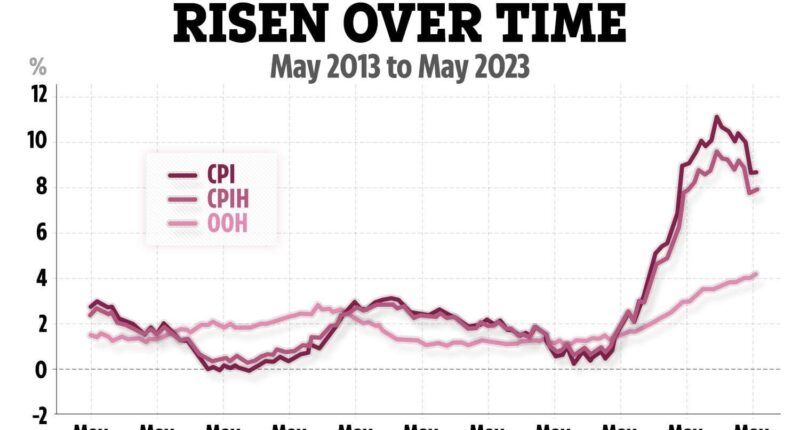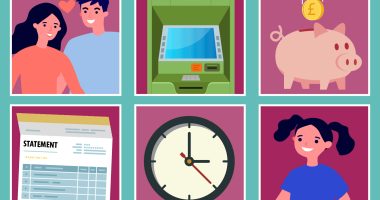MILLIONS of households are affected when inflation rates soar, but what does it really mean for you and how can you protect your finances?
Inflation stuck in May after a slight drop in April, which marked the first time that the rate has dropped below 10% since August 2022.
The Office for National Statistics (ONS) said rising prices for air travel, recreational and cultural goods and services and second-hand cars caused inflation to remain high.
May’s rate of 8.7% is still miles above what the Bank of England (BoE) would like it to be at 2%.
At last month’s Monetary Policy Committee (MPC) meeting the group of BoE experts, forecast that inflation is expected to fall to around 7% by the middle of the summer.
It will fall to 5.2% by the end of this year and 3.4% by next summer.


This is thought to be due to energy costs dropping, but food prices are still expected to remain higher for longer.
Below we reveal what high inflation rates mean for you and how you can protect your cash.
What is inflation?
Inflation is a measure of how much goods and services are worth in a given period.
This means how much the price of goods, such as food or televisions, and services, such as haircuts or train tickets, has changed over time.
Most read in Money
It’s known as a “backward-looking measure”, which means it indicates what has happened over the past year.
The rate of inflation is published each month by the ONS, which is a non-ministerial department which reports directly to Parliament.
The latest publication looked at prices in the 12 months to May 2023 compared to the previous year.
Fresh figures yesterday revealed the UK’s rate of inflation remained the same in May as in April, at 8.7%.
However, core CPI inflation, which excludes energy, food, alcohol and tobacco, stood at 7.1% in May, up from 6.8% in April.
That puts it at the highest rate it’s been since March 1992, the ONS said.
How inflation impacts your finances
Inflation doesn’t impact prices, rather it’s a measure of how prices have changed over the past year.
When it goes up, it means prices on everyday items, essentials, fuel and bills are higher – which in turn means household budgets are squeezed.
The BoE, the UK’s central bank, can hike what’s known as its base rate to try and bring high inflation down.
High-street banks use the BoE base rate to work out the interest rates it offers to customers
The move would make the cost of borrowing, including loans, credit cards and mortgage repayments more expensive.
But the hike is good news for savers as they may get better rates on their nest egg.
Yesterday’s figures make it likely the BoE will raise its base rate today from 4.5%.
Economists are expecting the figure to rise by 0.25 percentage points to 4.75%.
Although, some experts predict policymakers may even vote for a bigger rise of 0.5 percentage points.
How to protect your cash
Inflation-proofing your finances isn’t easy – essentially you need to find a way to grow your money at a faster rate than prices are rising.
For some people, this could mean investing – but this is risky and many don’t have spare cash to put in the stock market at the moment.
Having an emergency savings pot is helpful in times of inflation, to help cover any outgoings that might have increased unexpectedly.
You might consider asking for a pay rise at work, but there are no guarantees your company is in a position to offer one.
Be sure to make savings where you can – shop around for better deals on your car and home insurance, as well as broadband and mobile phone.
Save money by going to a cheaper supermarket, shopping for own-brand rather than premium products, and looking out for yellow-sticker bargains.
Make a budget and check your bank statements for any forgotten subscriptions you might be wasting money on.
Be sure to claim any financial support you’re entitled to as well – a benefits calculator can help you work out what you might qualify for.
Making extra cash in your spare time can help too, picking up a side hustle or selling your old clothes could give you a boost.
A woman recently told The Sun her £7,000 a month side hustle lets her make cash from her sofa – but some thinking its a boring chore.


While another woman revealed how she managed to make £9k just from renting out her clothes.
From being paid to watch movies to recycling old till receipts here are 20 easy side hustles you can do at home and make money.
Do you have a money problem that needs sorting? Get in touch by emailing [email protected]










